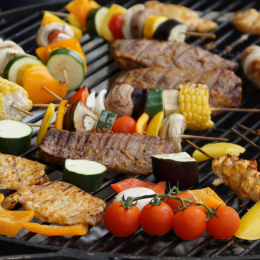 By: Kelsey Rigopoulos RDN, LDN
By: Kelsey Rigopoulos RDN, LDN
How many BBQ’s have you attended in the summer at which you felt totally at peace with food and fully at ease with what you ate? Picture it: juicy burgers smothered in your favorite condiments, every variety of salad possible – potato, Caesar, macaroni, orzo, Greek tortellini – and of course a plethora of cookies, cakes, and popsicles. A sign that you may be struggling to climb out of your diet ditch, rather than feeling excited about having fun in the sun, could be worry thoughts such as: “What’s the best choice to fit my points/calories?” “Are potatoes even good for you?” “Those cookies will definitely make me gain weight.”
If you resonate with this bombardment of food reflections, I want you to read this very carefully: you can make peace with food. For many people, one of the more difficult parts of the Intuitive Eating journey is the concept of giving yourself unconditional permission to eat all foods. This means no more food moralization, no more intentional restriction of food (unless of course you’re allergic), and hopefully, no more guilt.
Dieting frequently leads to feelings of deprivation – physical and/or mental. Some diets are incredibly forth coming about physically restricting certain foods (hey, Paleo/Keto/Whole Thirty/Ideal Protein and any food replacement shake, I’m looking at you). Others inherently use fear mongering by placing morality to foods in ways that encourage restriction (Weight Watchers can’t fool us)! Some, maybe the most confusing of them all, appear to “allow” all foods, but support deprivation by means of suggested portion sizes (beware of rigid label reading)! As always, I am not judging those using, or having used, these diets, nor those who publicly proclaim their diet success or sell certain products. I am, however, hard core hating on the culture that has created this environment that thrives on encouraging people to deprive themselves, lessen, become smaller, take up less space, or somehow be “better.”
At the end of the day, giving yourself unconditional permission to eat all foods means coming from a place where you are not deprived OF ANYTHING. Now, please realize, this is a very privileged principal as some people don’t have the access or ability to do this. If you do have this privilege, permission to satisfy your hunger can look like having two hot dogs instead of one at that BBQ, grabbing ice cream on a random Tuesday night, or keeping your favorite cookies in the pantry (yes, all the time). You may find that making peace with food in this way is fun and fulfilling AND can help reduce the nasty, un-fun biological and psychological effects of deprivation.
The human body has a very particular biological response to what it perceives as restricted energy. Hormones do their thing to send hunger signals like wild, whether they be in the form of a growling belly or preoccupied mind. Oh, and those cravings for good ‘ole sweet and salty? Turns out our brains love carbs and fat so much they’ve learned to send very special messages to influence us in changing our minds (“Just eat the dang pasta” – your hypothalamus). In addition to the brain response, restricted food intake also psychologically affects us. In what Intuitive Eating calls Rebound Eating (1) food deprivation of any kind often leads to craving more of that food that’s now seen as “extra special.” This also is known as the Forbidden Fruit Theory.
Although there are multiple ways to consider Rebound Eating, most people I’ve met resonate closest with The Last Supper effect (1). Even the perception of potential restriction can trigger overeating and lead to negative feelings. So, if you eat the super special forbidden food after having avoided it like the plague, you’re much more likely to eat past fullness. Your brain may say to you, “what if you never ever get to have it again?” The Last Supper effect can lead you to feeling shame, guilt, and frustration: “How dare I eat that awful food! And not just X portion, but Y portion! I must inherently be a failure for ever having given into such a terrible thing, therefore, diet Z starts tomorrow.”
Instead, consider the Intuitive Eating model – all foods are morally equal. There is nothing healthy or unhealthy, good or bad. Food is just food, in all of its delicious glory. What we know is that having a variety of foods around from day to day helps create this normalcy. Expectancy. We are much less likely to have Rebound Eating urges if there is no restricting. And that whole feeling guilty thing? There is no need, especially if you truly see all eating choices as equal and acceptable.
Okay, I know what you are thinking. “But I’d most certainly eat donuts for the rest of my life and gain a million pounds!” However, this is super unlikely to happen. Making Peace with Food is just one principles of IE. Other important principles include awareness of hunger, fullness, satisfaction, and eating with emotion. These skills together will help you build a better relationship with food and your body.
Perhaps you can observe the rules that you’ve made around diet culture and food. Can you simply be curious about how you think about foods without placing judgment? And can you choose to be kind to yourself when/if you do eat past fullness? Maybe you can start with some of your “forbidden” foods? If you’re feeling bold, keep a list (who doesn’t love something you can draw a line through?) Try keeping these food items, maybe one at a time, around the house. And when you’re craving said food? Eat it! Test it out. Want support with this? Feel free to reach out!
- Tribole, Evelyn, and Elyse Resch. The Intuitive eating workbook: Ten principles for nourishing a healthy relationship with food. Oakland, CA: New Harbinger Publications, Inc., 2017.
